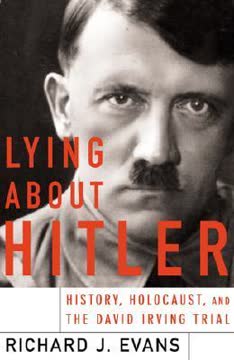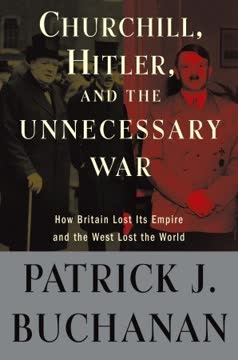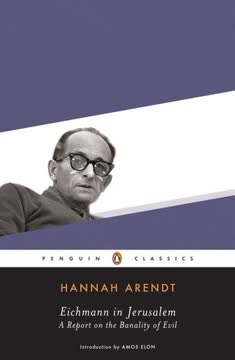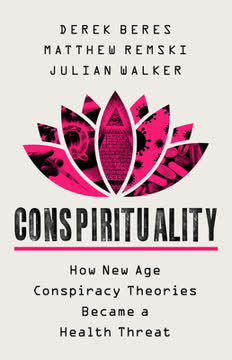Key Takeaways
1. Historical Objectivity: The Core Battleground of the Irving Trial
"What is historical objectivity? How do we know when a historian is telling the truth? Aren’t all historians, in the end, only giving their own opinions about the past?"
Fundamental questions. The libel trial brought by David Irving against Deborah Lipstadt and Penguin Books transcended a mere legal dispute, becoming a profound examination of historical truth itself. At its heart lay fundamental questions about how historians establish facts, interpret evidence, and maintain objectivity, especially concerning sensitive topics like the Holocaust. The court was tasked with distinguishing between legitimate historical debate and deliberate falsification.
Lipstadt's accusation. Deborah Lipstadt's book, Denying the Holocaust, accused Irving of being a dangerous Holocaust denier who "bends [historical evidence] until it conforms with his ideological leanings and political agenda." This grave charge necessitated a rigorous defense, forcing the court to delve into the minutiae of Irving's research methods and the veracity of his claims. The defense's strategy was to prove, beyond reasonable doubt, that Lipstadt's accusations were true.
The stakes were high. For many, the trial represented a crucial moment for the memory of the Holocaust and the integrity of historical scholarship. While some feared the court was an inappropriate forum for historical inquiry, the meticulous examination of documents and expert testimony ultimately provided a unique opportunity to expose the mechanisms of historical distortion and reaffirm the possibility of objective historical knowledge.
2. Irving's Self-Proclaimed Objectivity: A Façade for Ideological Bias
"I am an untrained historian... History was the only subject I flunked when I was at school."
A self-made historian. David Irving cultivated an image as an independent, fearless historian, unconstrained by academic conventions or political correctness. He boasted of unparalleled access to primary sources, claiming to have unearthed documents that "establishment" historians overlooked, thereby presenting a "real history" that challenged accepted narratives, particularly concerning Adolf Hitler. He saw himself as a "stone-cleaner," removing "grime and discoloration" from Hitler's image.
Hitler's "ambassador." Despite his claims of objectivity, Irving openly admitted to identifying with Hitler, viewing himself as the Führer's "ambassador to the afterlife." This personal connection permeated his work, leading to a consistently sympathetic portrayal of Hitler, often at the expense of historical accuracy. He believed Hitler was a patriot who sought Germany's greatness and was unfairly caricatured by postwar accounts.
Contempt for peers. Irving frequently disparaged academic historians as "idle" and prone to "inter-historian incest," suggesting they merely copied each other's work without consulting original sources. This rhetoric served to elevate his own status while dismissing legitimate scholarship that contradicted his views. However, his own methods, when scrutinized, revealed a pattern of selective use and manipulation of the very sources he championed.
3. Systematic Distortion: Exculpating Hitler from Antisemitic Violence
"Irving consistently and repeatedly manipulated the historical evidence in order to give the impression that it supported his view that Hitler did not know about the extermination of the Jews, or, if he did, opposed it."
A consistent pattern. The core of Irving's historical falsification lay in his relentless efforts to absolve Hitler of responsibility for the persecution and extermination of Jews. This was not a random occurrence but a systematic pattern observed across numerous key events and documents. His approach involved:
- Suppressing inconvenient information.
- Misconstruing or mistranslating documents.
- Manipulating statistics.
- Applying double standards to evidence.
The 1924 delicatessen incident. Irving claimed Hitler disciplined a Nazi squad for looting a Jewish delicatessen, portraying him as a protector of Jews. However, the original testimony revealed:
- The incident occurred before the putsch, not during.
- Hitler's concern was the squad removing party insignia, damaging the party's image, not protecting Jews.
- The witness was a known Nazi supporter, whose testimony was deemed biased by the court.
Irving omitted these crucial details, twisting the narrative to fit his exculpatory agenda.
Fabricated crime statistics. To explain Nazi hostility towards Jews, Irving cited "Interpol figures" from 1930-1932, claiming Jews dominated crime in Weimar Germany. However, these figures were:
- Not from Interpol, but from a Nazi propaganda press conference by Kurt Daluege.
- Published in Deutsches Nachrichtenbüro, a Nazi mouthpiece.
- Grossly inaccurate and contradicted by official Weimar crime statistics.
Irving not only used a propaganda source as objective fact but also misquoted its already false figures, demonstrating a deliberate intent to mislead.
4. The "Kristallnacht" Deception: Rewriting Hitler's Role in the Pogrom
"Irving’s entire portrayal of the events of 9–10 November seemed to me designed to diminish the suffering of the Jews."
Goebbels's diary manipulation. Irving blamed Joseph Goebbels entirely for the "Kristallnacht" pogrom, claiming Hitler was unaware and tried to stop it. He cited Goebbels's diary entry for November 9, 1938, but:
- Mistranslated "Polizei zurückziehen" (withdraw the police) as "hold back the police."
- Omitted Goebbels's note that Hitler ordered "let the demonstrations go on" and that "The Jews must for once feel the people’s fury."
- Ignored the context of widespread destruction in other cities already reported to Hitler.
This selective translation and omission fundamentally altered Hitler's direct involvement and approval.
Ignoring police directives. Irving downplayed the significance of two telexes sent by SS leaders Heinrich Müller and Reinhard Heydrich on the night of November 9-10, 1938, which explicitly ordered police not to interfere with anti-Jewish actions, except to prevent damage to German property. Irving:
- Hid Müller's telex in a footnote.
- Misrepresented Heydrich's telex as an order to "restore law and order, protect Jews and Jewish property, and halt any ongoing incidents," when it ordered the opposite.
These directives, likely issued after consultation with Hitler, clearly implicated the highest levels of the Nazi regime.
Discrediting contemporary evidence. Irving relied heavily on dubious postwar testimonies from Hitler's adjutants, who claimed Hitler was furious about the pogrom and tried to stop it. However, these accounts were:
- Given by loyalists seeking to exculpate Hitler after the war.
- Contradicted by contemporary documents, such as Goebbels's diary, which showed Hitler's approval and Schaub's active participation in the violence.
- Often based on hearsay or leading questions from Irving himself.
Irving's preference for self-serving postwar accounts over contemporary evidence further exposed his biased methodology.
5. Fabricating Hitler's Innocence in the "Final Solution"
"Irving’s version of the Hitler table talk in this instance thus amounted to a conscious and deliberate manipulation of the source-material."
The "no liquidation" order. Irving repeatedly cited Himmler's phone log entry for November 30, 1941, claiming it was "incontrovertible evidence" that "Hitler ordered... that Jews were not to be liquidated." However, scrutiny revealed:
- The entry referred to a single trainload of Jews from Berlin, not a general order.
- There was no evidence Himmler spoke to Hitler before the call; Himmler's diary showed he met Hitler after.
- The specific trainload of Jews from Berlin was, in fact, massacred upon arrival in Riga.
Irving's initial claim was a complete fabrication, later partially retracted but still used to imply Hitler's innocence.
The "Juden zu bleiben" mistranslation. Irving claimed Himmler's phone log for December 1, 1941, contained an order: "Jews are to stay where they are." This was a deliberate mistranslation of "Verwaltungsführer der SS haben zu bleiben" (Administrative leaders of the SS are to stay). Irving:
- Misread "haben" (have) as "Juden" (Jews), despite clear handwriting.
- Ignored the grammatical context and other similar letters in Himmler's hand.
This egregious error, maintained in later editions of his books, demonstrated a wilful distortion to support his narrative of Hitler protecting Jews.
The "Schlegelberger memorandum" deception. Irving presented a 1942 Justice Ministry memo as proof that Hitler wanted the "solution of the Jewish Question put off until after the war." However:
- The memo likely referred only to "half-Jews" and those in "mixed marriages," not all Jews.
- The Justice Ministry itself was actively involved in deporting and exterminating Jews in the months following this memo.
- Irving's interpretation contradicted his own claim that Hitler was unaware of the extermination, as it implied Hitler knew about the "solution" but wanted to delay it.
This document, far from exculpating Hitler, actually highlighted his awareness and complicity in the broader "Final Solution."
6. Holocaust Denial: Irving's Deliberate Shift to Extremism
"Irving clearly held all four central beliefs of the deniers as defined at the beginning of this chapter."
A gradual embrace. While initially accepting the "methodical liquidation of Russian Jews" in his 1977 Hitler's War, Irving's views dramatically shifted after the 1988 Ernst Zündel trial, where he testified as an expert witness for the defense. By 1991, he had systematically removed all references to "extermination" from his revised Hitler's War, replacing them with vague terms like "Jewish tragedy."
The four pillars of denial. Irving's post-1988 statements aligned perfectly with the core tenets of Holocaust denial:
- Minimization of deaths: He claimed "100,000 or more" Jews died, primarily from disease, not 6 million. He dismissed Einsatzgruppen reports as exaggerated.
- Denial of gas chambers: He asserted "there were no gas chambers in Auschwitz," calling tourist displays "fakes." He championed the discredited "Leuchter Report" as proof.
- Rejection of systematic extermination: He argued killings were "disorganized ad hoc efforts" by "individual gangsters and criminals," not a centrally directed policy.
- Fabrication of the Holocaust myth: He claimed the "gas chamber lie" was invented by British intelligence and perpetuated by Jews for financial gain (reparations for Israel).
"Holocaust analyst" not "denier." Irving attempted to rebrand himself as a "Holocaust analyst" or "challenger" rather than a "denier," claiming the latter implied lying. However, his consistent rejection of established facts and his embrace of discredited theories left no doubt about his true position. His "analysis" was a euphemism for denial.
7. Inflating Dresden's Death Toll: Creating False Moral Equivalence
"Irving’s efforts to boost the numbers killed in the Dresden bombing raids seemed designed from the very beginning to establish a moral equivalence with the Nazi killing of the Jews."
Early career distortions. Irving's first major work, The Destruction of Dresden (1963), established his reputation but also revealed his propensity for historical manipulation. He consistently inflated the death toll of the 1945 Allied bombing raids, initially relying on dubious sources and later on a known forgery, to create a narrative of Allied war crimes comparable to Nazi atrocities.
The forged "TB 47". Irving championed "Order of the Day no. 47" (TB 47), which claimed 202,040 deaths, expecting it to rise to 250,000. He presented this as authentic, despite:
- His earlier dismissal of it as a "thoroughly spurious" Nazi propaganda piece.
- Its lack of official stamps or signatures.
- Its figures being wildly disproportionate to other bombing raids.
- The fact that it was a crude forgery, with zeros added to actual figures (e.g., 20,204 became 202,040).
He knowingly promoted this fake document for decades, even after its fraudulent nature was conclusively proven by other historians.
Minimizing Jewish deaths, maximizing German deaths. Irving's manipulation of the Dresden figures served a clear ideological purpose: to diminish the uniqueness and scale of the Holocaust by presenting Allied actions as equally, if not more, heinous. He explicitly compared the alleged 250,000 Dresden deaths to his minimized figure of 25,000 deaths at Auschwitz, declaring, "I see very little difference." This false equivalence was a cornerstone of his revisionist agenda.
8. Antisemitism and Extremist Ties: The Ideological Underpinnings
"Irving has repeatedly crossed the divide between legitimate criticism and prejudiced vilification of the Jewish race and people."
Beyond historical debate. Lipstadt's accusation that Irving's distortions were driven by "ideological leanings and political agenda" was central to the defense. The trial revealed Irving's deep-seated antisemitism and his extensive connections to far-right and neo-fascist groups, demonstrating that his historical "revisions" were not academic but politically motivated.
Antisemitic rhetoric. Irving frequently employed classic antisemitic tropes, referring to Jews as "our traditional enemies," "cockroaches," and a "greasy and slimy community." He accused "international Jewish conspiracy" of controlling media, banking, and professions, echoing Nazi propaganda. He even suggested Jews were responsible for their own persecution, asking, "why does it always happen to the Jews?"
Association with Holocaust deniers. Irving maintained close ties with the Institute for Historical Review (IHR), a leading Holocaust denial organization. He:
- Was a frequent speaker at their conferences.
- Published articles in their Journal of Historical Review.
- Endorsed the IHR as "sincere, balanced, objective, and devoid of polemics."
Despite his claims of merely "analyzing" the Holocaust, his active participation and endorsement of such groups cemented his identity as a denier.
9. The Courtroom as a Crucible for Historical Truth
"The court’s proceedings were surprisingly informal, and Mr. Justice Gray in general applied the rules in what seemed to me to be a fairly relaxed way. But the obligation on the witnesses, including Irving himself, to tell the truth, allowed merciless, relentless questioning..."
Unusual forum, rigorous scrutiny. While many questioned the suitability of a libel court for adjudicating historical truth, the trial's unique format proved surprisingly effective. Without a jury, the judge, Mr. Justice Charles Gray, meticulously examined thousands of pages of documents and expert reports, allowing for an unprecedented level of detailed historical scrutiny. The obligation to testify under oath, coupled with relentless cross-examination, exposed Irving's methods.
Irving's self-sabotage. Irving's decision to represent himself, while giving him a platform, ultimately backfired. His chaotic cross-examination style, frequent interruptions, repetition of questions, and inability to provide documentary evidence for his assertions frustrated the judge and undermined his credibility. His attempts to discredit expert witnesses often devolved into personal attacks or irrelevant tangents.
The power of evidence. The trial demonstrated that historical truth, even in complex and emotionally charged areas, can be established through rigorous examination of evidence. The defense systematically dismantled Irving's claims by:
- Presenting original documents that contradicted his narratives.
- Highlighting his mistranslations and omissions.
- Exposing his reliance on forged or unreliable sources.
- Demonstrating the ideological motivation behind his distortions.
The court's insistence on verifiable facts and logical reasoning proved a powerful antidote to Irving's speculative and manipulative approach.
10. The Verdict: A Resounding Vindication of Historical Integrity
"In my view the Defendants have established that Irving has a political agenda. It is one which, it is legitimate to infer, disposes him, where he deems it necessary, to manipulate the historical record in order to make it conform with his political beliefs."
A definitive judgment. Judge Charles Gray's 350-page judgment was a comprehensive and devastating indictment of David Irving's historical methodology and character. While acknowledging Irving's "remarkable" command of documents as a military historian, the judge unequivocally concluded that:
- Irving "misrepresented and distorted the evidence."
- His errors were "unlikely to have been innocent," but rather "deliberate."
- He "qualifies as a Holocaust denier."
- He was "anti-semitic" and a "racist," associating with "neo-fascists and right-wing extremists."
The verdict was a complete vindication for Deborah Lipstadt and a crushing defeat for Irving.
Irving's "Pyrrhic victory" illusion. Despite the unequivocal judgment, Irving attempted to spin the outcome as a "victory," claiming he had gained immense publicity and exposed a "Jewish conspiracy." He dismissed the judge's findings as "perverse" and attributed his loss to the "establishment." However, the media, initially intrigued, largely turned against him, and his reputation among serious historians and even some deniers was irrevocably damaged.
A blow to denial. The judgment delivered a significant blow to Holocaust denial, not by silencing debate, but by exposing the fraudulent nature of its proponents' methods. It demonstrated that denial is not a legitimate historical interpretation but a form of ideologically driven propaganda based on deliberate falsification. The trial provided a powerful, publicly accessible record of how historical truth can be defended against malicious attacks.
11. Beyond the Trial: Upholding the Standards of Genuine Scholarship
"If we mean by historian someone who is concerned to discover the truth about the past, and to give as accurate a representation of it as possible, then Irving is not a historian."
Defining a historian. The trial underscored the fundamental distinction between genuine historical inquiry and ideologically motivated propaganda. A true historian, as the book argues, is bound by a "vital minimum of ascetic self-discipline" to:
- Abandon wishful thinking.
- Assimilate contradictory evidence.
- Discard pleasing interpretations that fail evidentiary tests.
- Read sources fully and fairly, even when they challenge preconceptions.
Irving, by consistently violating these principles, forfeited his claim to be a historian.
The limits of interpretation. While historical interpretation allows for diverse perspectives and debates, these are constrained by the available evidence. The trial demonstrated that there are limits beyond which interpretation becomes distortion, and disagreement becomes deliberate falsification. Irving''s "fried egg" where a "mountain" should be, as the author's metaphor suggests, is not a different interpretation, but a fundamental misrepresentation.
A victory for truth. The Irving v. Penguin Books trial was ultimately a triumph for historical truth and the rigorous standards of scholarship. It affirmed that facts matter, that evidence can be verified, and that deliberate manipulation of the past, especially for hateful ideological ends, will be exposed. The judgment serves as a powerful reminder of the historian's ethical responsibility to pursue truth, even when it is inconvenient or challenging.
Last updated:
Review Summary
Lying About Hitler is praised for its thorough examination of David Irving's Holocaust denial and the subsequent libel trial. Readers appreciate Evans' meticulous analysis of Irving's historical distortions and the book's insights into historiography. Many find it a compelling read, though some note its academic density. The book is lauded for its exploration of historical objectivity and the responsibilities of historians. While some reviewers desired more detail about the trial itself, most consider it an important work exposing Irving's deliberate falsifications and the dangers of Holocaust denial.
Similar Books
Download PDF
Download EPUB
.epub digital book format is ideal for reading ebooks on phones, tablets, and e-readers.








